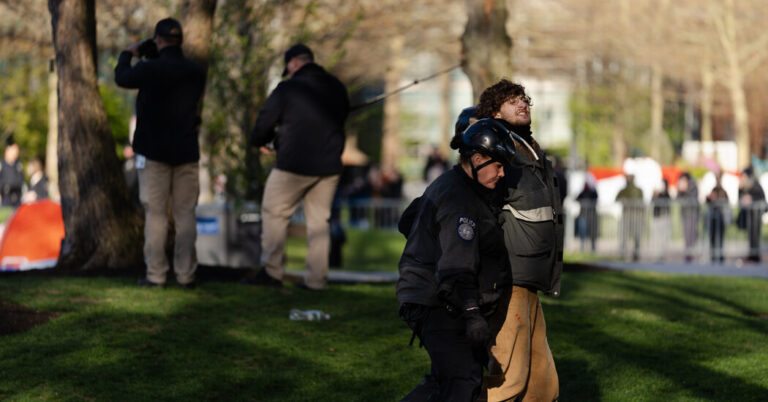Amid a series of dizzying clashes involving pro-Palestinian protests and encampments at colleges, schools that repressed the demonstrators Over the weekend, they gave various justifications for their actions, while others sent mixed signals through their inaction.
Behind it all was a central question facing university leaders across the country: When does a protest cross the line?
Colleges cited property damage, outside provocateurs, anti-Semitic expressions or simply failure to heed warnings to justify their decision. clean up the camps and arrest the students. Student groups have strongly denied or questioned many of these claims.
Northeastern University in Boston, Washington University in St. Louis, Indiana University in Bloomington and Arizona State University forced police to intervene Saturday in protests, which led to more than 200 arrests. At other schools — including Columbia, Penn, Harvard and Cornell — chilly tension persisted Sunday as leaders warned of possible consequences for protesters but had yet to follow through.
At the University of Washington, where campus police officers made 100 arrests Saturday, administrators said a group violated university policy by beginning to set up camp on the east end of campus. Officers arrested people who refused to leave “after being questioned multiple times,” university administrators wrote.
“No one has the right to disrupt the ability of our community members to learn and work,” they said.
More than 800 people have been arrested since April 18, when the New York Police Department liberated a camp in Colombia.
At Northeastern, where 102 protesters were arrested earlier Saturday, a university spokesperson said the protest was “infiltrated by professional organizers” and that someone used “virulent anti-Semitic slurs.” The protesters denied both claims.
Many school leaders insisted that people outside their universities were fueling the clashes, despite the limited amount of evidence supporting their claims. In many cases, the group of protesters was comprised primarily of university students and employees, with the notable exception of the University of Washington on Saturday. Of the 100 arrests made, only 23 involved students and four involved employees, the university said in a statement. statement on Sunday.
But at other colleges, schools did not cite evidence to support their claims, and the influence of outsiders was unclear.
About 200 people attended a pro-Israel demonstration on Sunday at the University of Pennsylvania in Philadelphia, a few hundred meters from a pro-Palestinian encampment. Noah Rubin, a student who spoke at the pro-Israel rally, said not all pro-Palestinian protesters are Penn students.
“We have a few documented people who have a history of violence in Philadelphia,” he said, although he did not provide further details. A spokeswoman for the camp did not respond to a request for comment on Mr. Rubin’s allegations.
Some schools have tried to curb the influence of outsiders. For example, Harvard sought to restrict access only to those who presented a university ID card. At Northeastern, authorities had asked protesters for their student IDs earlier in the week before the arrests on campus Saturday. Some protesters showed them, while others refused. At Columbia, which closed its doors, protesters on the other side added to the sense of chaos, many of them shouting anti-Semitic chants and threatening students.
Protesters set up an encampment at Mary Washington University in Fredricksburg, Virginia, on Friday, but after the demonstration opened to the public, university officials, citing security concerns, asked organizers to dismantle their tents, which they did early in the night. . A peaceful protest continued Saturday, when “outside influences” caused the encampment to expand again, Troy D. Paino, the university’s president, said in a statement on Sunday.
When the tents were put up Saturday afternoon, the university said, organizers were asked to leave. Twelve demonstrators, including nine students, who remained there were then arrested.
But while administrators at some schools have tried to point the finger at protesters from outside the community, it has often been their own students who have been arrested. At Emory University in Atlanta, 20 of the 28 people arrested Thursday had ties to the school, despite authorities’ insistence that no one involved in the encampment was affiliated with the university.
Emory President Gregory L. Fenves said in a statement On Sunday, a peaceful protest on Saturday was disrupted by people spray-painting “hate messages” on the exterior walls of a building and vandalizing other structures.
“Emory is overcoming a divide between individuals who wish to express themselves peacefully and those who seek to use our campus as a platform to promote discord,” Dr. Fenves said, adding that such incidents “must be rejected and condemned.” .
The high-profile conflicts fueled more protests, particularly on campuses where demonstrations had been dismantled earlier in the year.
In Stanford, where a previous encampment was demolished in February, protesters set up a second encampment on Thursday. Administrators said in a statement On Friday, he delivered letters to about 60 students warning them that “failure to cease conduct in violation of university policy” could result in disciplinary action or even arrest.
Anna Betts, Colbi Edmonds, Jon Hurdle And Bernard Mokam reports contributed.


